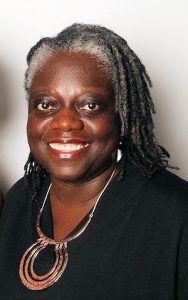Launch of the North West Black, Asian and Minority Ethnic Strategic Advisory Committee
“We will positively disr upt the system in order to get the change that we want to see”
upt the system in order to get the change that we want to see”
Evelyn Asante-Mensah, Chair, North West Black, Asian and Minority Ethnic Strategic Advisory Committee and Chair Pennine Care NHS Foundation Trust
Bill McCarthy, North West Regional Director for NHS England-Improvement, approached me earlier in the summer and asked me if I would be a part of the North West’s Incident Management Team responding to the pandemic as a non-exec, but also bringing to the role a lived experience of someone from a black and minority ethnic community.
I had a long conversation with him, and honestly, it was a bit of a surprise to be asked, if I’m honest. I wasn’t really expecting it, but it was such a good opportunity to understand how the incident was being managed, and to bring a different perspective to that.
He also asked if I would co-chair the BAME advisory group which he wanted to set up in the North West. I thought it was really an exciting opportunity and agreed I would do it.
We are responsible to feed issues that arise in terms of management of incident, from that group into the broader IMT, and at the same time, ensure BAME issues are at the forefront of our decision-making processes. For me it’s about tacking inequalities and bringing a different perspective to the table.
I think there is a massive opportunity in terms of that advisory group, and a real chance for the North West to be at the forefront of really challenging and tackling health inequalities, and the inequalities faced and experienced by people in our communities during this crisis. I think we’ve been able to bring together a wide range of people already. We held our first meeting this week, and we had more the 60 people on the call from BAME backgrounds, working at senior levels in both providers and commissioners. There is a real drive from them already for a system-led approach to the work, and for real change that calls on their experience and professional expertise, and the actual lived experience of BAME leaders from across the region.
It’s not just about the incident though. The pandemic is a catalyst for setting this up, but there is a phenomenal opportunity here to systematically change the face of the way we deliver health and social care across the region.
Even though this was initially a response to the ways that COVID has disproportionately impacted on BAME communities, part of what I am really excited about is that we are tackling the pandemic, we are dealing with racism and racial injustice, but we see this as having longevity.
The challenges are that it is just a huge issue to tackle, that we will positively disrupt the system in order to get the change that we want to see. We can’t tinker around the edges, because there is no low-hanging fruit here. This is about systemic change, and that takes time. We expect challenge, and push back, because it is easy to talk about change, but when it actually starts to impact you, it can be quite uncomfortable.
It will be challenging, but this is about thinking in the long-term, and we have to rise to that. We’re living in a unique time right now, with COVID and Black Lives Matter. We have created a voice and a genuine movement of people that want change, but that window won’t stay open forever. We must capitalise on it now, and really seize the opportunities that are in front of us.
There will be challenges, but I am confident we will work through them and the conversations that are already happening are so positive. People are open and honest and hungry for change. Bringing all of these people together in one room, with all their experience and expertise, is just phenomenally powerful.
I think what we want from this work, is for people to be open and honest with us. This needs to be system wide, across the whole of the health and social care system. At the moment we are thinking about who else needs to be part of the groups we are setting up, and the assembly we are forming. We need to know what sort of things we should be thinking about, and what we should be considering, whether there are people or groups we should be engaging with, all of that.
If people want to know and find out more about what we are doing, and how they can get involved, I would be very happy for them to contact me, or contact Kirsty McBride, who is helping to organise all of this.
This is not just about a group of us sitting in a room together talking, this is about our region, it’s about equality, and it is about all of us. We are public servants, and that means we must make sure that equality is intrinsic in everything we do.
Evelyn Asante-Mensah is the Chair of Pennine Care NHS Foundation Trust, a mental health and learning disabilities trust working within Greater Manchester, which covers five local authorities, and provides mental health and learning disability services across Stockport, Heywood, Middleton and Rochdale, Oldham, Bury, Tameside and Glossop; chair of Arawak Walton Housing Association, which provides housing in Greater Manchester; Governor and Board member at Manchester Metropolitan University; Associate Governor at St Mary’s Primary School in Moss Side in Manchester.
